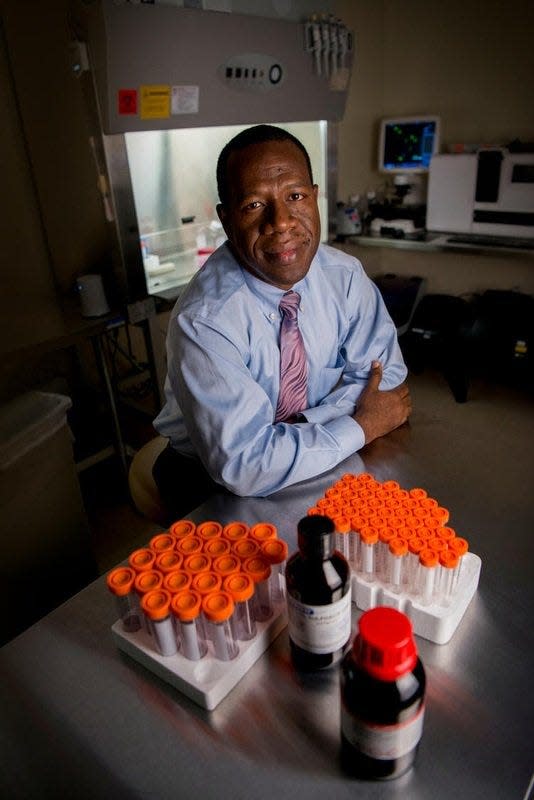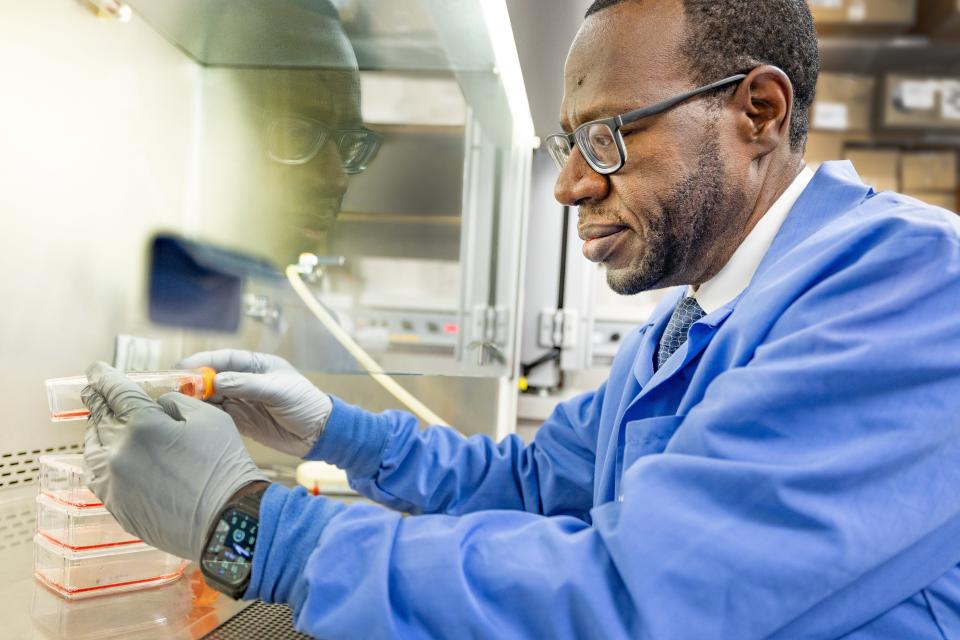It's liftoff: Journey led from Nigeria to Mayo Clinic, then to International Space Station

Abba Zubair grew up in crowded Kano, Nigeria, and though it was the second-largest city in the country, it was still prone to frequent, extended electrical blackouts. For young Zubair, that meant no TV, no radio, but he didn't mind, for with the lights out he could gaze at the vast array of stars that shone in the skies over northern Nigeria.
What's out there, he wondered?
He decided he wanted to see for himself: He would become an astronaut. “I want to go there, and I want to find out," he said.
As a teen, a top student in physics and math, he devoured episodes of the 1970s TV show "Space: 1999." He was studious, with a craving for knowledge. He would go to the British consulate and read journals and encyclopedias, learning everything he could on a variety of topics. And he joined a group of like-minded teens named Nigerian Young Inventors, who built a rocket that could have flown if only they'd had explosives to propel it into the air.
That was all preparation for his astronaut career.
Some 40 years later, on the Jacksonville campus of Mayo Clinic, he chuckled as he looked back fondly on those ambitions, which got knocked down some toward the end of high school.
“My career adviser said, 'Abba, before Nigeria starts sending rockets and having astronauts, it won’t be in your lifetime. 'Find something more down to earth.'”
More down to earth: He channeled his intelligence and ambition into medicine, a career path that led him to England, Switzerland and the U.S.
Since 2003 he has been at Mayo Clinic, where he is with the Department of Laboratory Medicine and Pathology. As a regenerative medicine expert, he is doing research with a particular interest in finding ways to grow stem cells for eventual clinical use on patients.
His dream of space is still alive, though, in a research project he led that lifted off on Jan. 30 in a SpaceX Falcon 9 rocket bound for the International Space Station.
In the spacecraft's payload were donated adult stem cells, extracted from bone marrow, which astronauts on the space station will use in experiments to assess how the lack of gravity affects bone loss — a condition that would be a particular problem for astronauts on long journeys to, say, Mars.
The study could also have implications for people on Earth with osteoporosis. Zubair and his team hope that what they learn from the weightless experiments will lead to ways to prevent or treat the bone loss that comes with osteoporosis.

The research will be done over two space flights, with the second tentatively scheduled toward the end of the year.
From 2018: Mayo Clinic researchers studying space medicine device
For Zubair, who is 56, it's a way of integrating the two great interests of his life.
“I’m interested in medicine but that’s not my first love," he said. That would, of course, be space. "And then the opportunity to match these together? It’s like a dream come true."
Help for stroke victims?
This current experiment is not the first time his research has taken place in space. In 2017 a rocket carried donated stem cells to the space station to determine if they could be quickly mass-produced in microgravity, with an eye toward using them to help stroke victims by promoting the growth of brain cells.
The research showed, he said, that some types of cells grown without the presence of gravity grew faster, while some grew at the same pace as on Earth. But the cells grown in space seemed to be more "potent," he said, and could be promising for eventual human use.
Bill Nelson: Future of space is in Jacksonville, as local firm Redwire works on NASA mission
That mission had a particular personal resonance for Zubair. His mother died of stroke complications when he was in the U.S., just after getting his PhD.
“This was her proudest moment and then suddenly she passed away," he said. "I really don’t want this to happen to anybody else.”
From Nigeria to Canaveral
On Jan. 30, Zubair was at Cape Canaveral to watch the rocket take off with his project, just as he did for the 2017 flight.
"Now, my feeling is a piece of me, going into space," he said in a video Mayo made about that earlier project.
Though he never became an astronaut, Zubair has had a couple of experiences that gave him a real feeling for what it might be like in space. He's flown on two zero-gravity flights, one from Orlando and another from Cape Canaveral, that simulated weightlessness.
He laughed as he told how he had to learn to control his limbs — and how he quickly figured out how to float, weightless, from one place another.
"It was the best thing I did in my life," he said. “You fly like a bird. I mean, it's just unbelievable. There’s nothing in life — you can’t imagine it until you experience it.”
He recognizes what a journey his life has been, all the turns that led him to where he is now. He tells how his life was transformed after his father died of cancer when Zubair was just 5. In his culture, he said, it was tradition for children in such a situation to live with their father's side of the family so, while he stayed close to his mother, he was sent to live with an uncle.
It was a large family, and young Zubair was often left to his own devices. "Nobody was really responsible for me. I had to fend for myself," he said.
He could have easily gone astray, but he found his way in study and dreams and those old heavy encyclopedias at the British consulate — the start of a winding path that led him to Jacksonville, and eventually, to outer space.
“It’s still so unreal, from where I started, and the thought of space, and where we are now," Zubair said. "I never thought I would be where I am."
This article originally appeared on Florida Times-Union: Mayo Clinic scientist in Jacksonville's stem-cell project is in space

